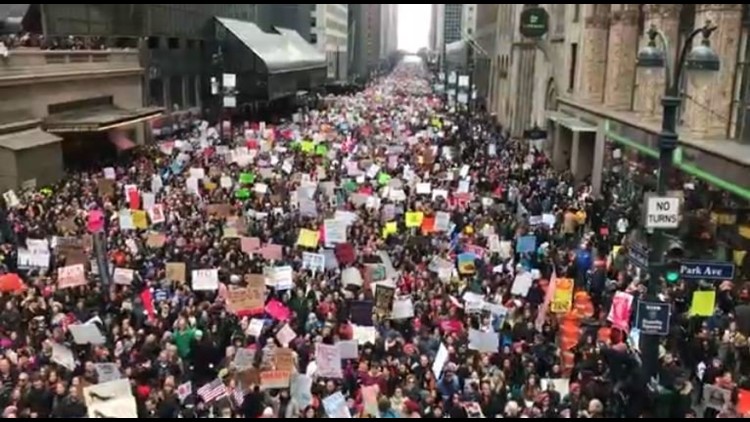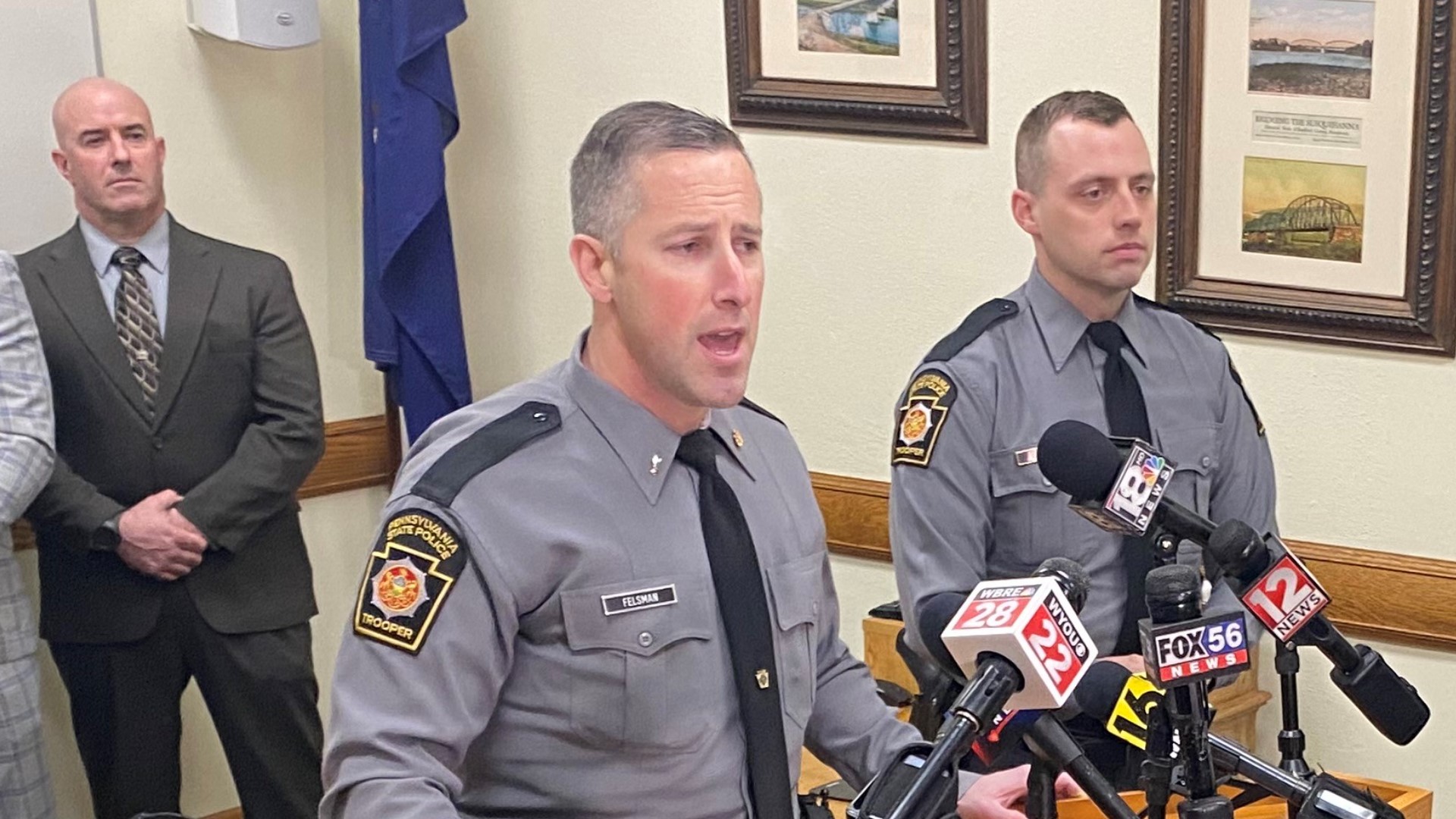One year after women took to the streets in droves to protest President Donald Trump’s inauguration, marchers are gathering again in cities across the country and around the world in a sharp rebuke of Trump’s presidency and in continuation of a still-growing international movement.
This second year of the Women’s March also comes in the middle of the #MeToo movement, which has shed light on sexual misconduct and ushered in social change in a bevy of industries. It also comes months ahead of the midterm elections in the United States, in which progressive women hope to turn their activism into victories at the ballot box.
In Washington, where one year ago hundreds of thousands of women clad in pink hats took to the streets and vowed to resist Trump’s presidency, Heather Tucci said she didn’t want to stay on the sidelines.
“Before Trump, I was content to sit back and watch the government just go by me. Now I’m not,” Tucci, from Harford County, Maryland, told CNN. “It is dire that we do something because it is just ridiculous what is happening to this country, what people think about us around the world and just undermining the basic fundamentals of humanity and the constitution and what democracy should stand for.”
Kelley Robinson, Planned Parenthood’s national organizing director, told CNN that it’s “nothing new for women to be involved in elections,” but said that many women who marched last year had been spurred to run for office themselves.
“It’s a time where we’re not just showing up — folks are saying that, ‘Hey, we actually need to be sitting in those chairs,'” Robinson said. “You know, so everyone who was out in the airports rallying last year and marching in the streets, many of them are now sitting in state legislatures across the country. It’s a powerful moment that we’re in.”
That movement, Robinson added, “is evolving into something more powerful every single day.”
The protests did not go unnoticed by the White House. On Saturday, Trump tweeted that it’s “a perfect day for all Women to March.”
“Beautiful weather all over our great country, a perfect day for all Women to March,” Trump wrote. “Get out there now to celebrate the historic milestones and unprecedented economic success and wealth creation that has taken place over the last 12 months. Lowest female unemployment in 18 years!”
Marchers gathered across the country and around the world hours after much of the United States federal government shut down after members of Congress failed to reach an agreement on a spending measure, casting uncertainty over much of the nation. Marchers, however, stayed the course.
One of the largest demonstrations unfolded Saturday in Los Angeles.
Kathleen Whitehead and her 13-year-old daughter, Casey Feldman, arrived early to that march. Feldman carried a green sign that said, “Respect Existence or Expect Resistance.”
“The battle against women and health care is killing us,” Whitehead told CNN. “It is 2018. I am 46 years old. My mother had to do this battle. Why do I, why? We have gone the wrong way.”
Gioconda Aviles came to the Los Angeles march with her 9-year-old twin daughters.
“I think women are more empowered this year,” Aviles, who attended the march last year as well, told CNN. “I can’t believe we have the president we have. I’m Latina, pushed to get Latinos to vote. Clearly, we didn’t do a good job. I think we need to make the difference in 2018.”
June Williams and her husband, Carlos, said their motivations for marching have shifted since the inaugural Women’s March.
“Last year was, we were angry that a person can get into office with his record and past,” Williams said of Trump. “Hey, there’s a lot of us who don’t agree. He’s not our president. This year for me, it’s about equal status for women. Without people getting out and voting, look what happens.”
In New York, Maura O’Meara, 47, of New Paltz, organized a group of women from the Hudson Valley area to travel to New York City together to participate in the march. She said her motivations for marching are largely the same as last year, when she traveled to DC, but have gained new urgency.
“We haven’t been quiet since last year. We’ve been up and out trying to fight for the rights of women and the vulnerable,” she said. “I actually have more hope now.”
Celebrities lend voices to Los Angeles Women’s March
Thousands gathered Saturday in Pershing Square in downtown Los Angeles for the second Women’s March, lending their voices to the protests nationwide in anticipation of hearing from a slate of celebrity speakers.
March organizers honed in on this year’s midterm elections using the theme “Hear Our Vote.”
But the rally was much more than electoral politics for many attendees. Demonstrators advocated for women’s rights and equality as much of the sentiment in this year’s march overlapped with the #MeToo and Time’s Up movements.
Eva Longoria, Natalie Portman and Scarlett Johannson were among a long list of famous folks who addressed massive crowds as they reached the march’s end at Grand Park and City Hall. Here’s what they had to say:
Eva Longoria
“This march and this movement is far more ambitious in scope and scale and it extends beyond one political actor or even one political party. What we’re calling for is sustainable and systematic change to the experience of women and girls in America. A change from fear and intimidation to respect. From pain and humiliation to safety and dignity. From marginalization to equal pay and representation.”
Natalie Portman
“I keep hearing a particular gripe about this cultural shift and maybe you have, too. Some people have been calling this movement puritanical or a return to Victorian values, where men can’t behave or speak sexually around dainty, delicate, fragile women. To these people I want to say, the current system is puritanical. Maybe men can say and do whatever they want, but women cannot. The current system inhibits women from expressing our desires, wants and needs, from seeking our pleasure.”
Scarlett Johansson
“While Me Too means different things to different people, to me, it is very simply the ability to empathize with the visceral realities of this condition. I want to move forward. And for me, moving forward means my daughter growing up in a world where she doesn’t have to be a victim of what has cruelly become the social norm. That she doesn’t have to fit into the bindings of the female condition. Time’s up on the female condition. …
“I stand before you someone that is empowered, not only by the curiosity about myself and the active choices that I am finally able to make and stand by, but by the brightness of this movement, the strength and the unity that this movement has provided. It gives me hope that we are moving toward a place where our sense of equality can truly come from within ourselves.”



